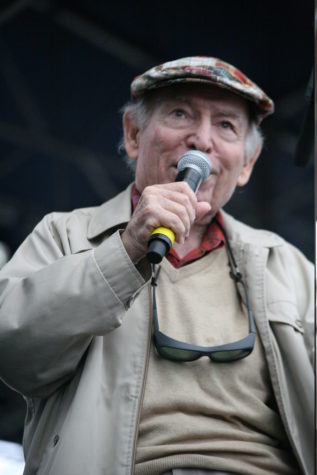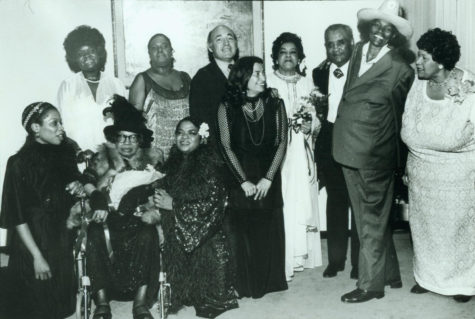Celebrating Jazz Fest mastermind George Wein

George Wein, jazz pianist and pioneer of the New Orleans Jazz and Heritage Festival died Sept. 13 at the age of 95. The impresario’s legacy helped jazz music become what it is today in American culture. He is remembered as a champion of jazz, art, philanthropy and equality.
Born in Lynn, Massachusetts on Oct. 3, 1925, Wein became a professional musician as a teenager. He played piano well into his 80s. In 2019, at Newport Jazz Festival he announced that it would be his “last performance as a jazz musician.” Wein’s legacy in the jazz world, however, lives on.
Before dipping his toes in the New Orleans jazz scene, Wein created the Newport Jazz Festival — the country’s first outdoor jazz festival — in 1954. Headliners at the Newport debut included Billie Holiday, Dizzie Gillespie and Ella Fitzgerald.
In 1962, New Orleanians contacted Wein about producing a festival in the city. In his eyes, segregation laws at the time made producing such an event impossible. Wein’s wife, Joyce, was Black and Wein was concerned that musicians of different races would not be able to perform on stage together.
Following the Civil Rights Act of 1964, a jazz festival launched in New Orleans under a different producer. In 1969, Wein took over the event and curated a team of local advisors. Of that inner circle was Tulane University’s Jazz Archivist Dick Allen, Quint Davis, a student worker at Tulane’s William R. Hogan Jazz Archive and Davis’ then-girlfriend, Allison Miner. Davis is now the event’s producer and director.
In Wein’s eyes, the event needed to be more than a music festival. He aspired to create a “heritage fair” that highlighted local artists, artisans and food. These aspects remain integral to today’s Jazz Fest.
Wein’s first Jazz Fest occurred in 1970 in what is now Congo Square. The lineup included Duke Ellington, Mahalia Jackson, Pete Fountain and Al Hirt. Yet, Wein struggled to draw an audience
“Despite considerable grassroots promotional effort, a cornucopia of talent, the unique character of the festival and an admission charge of merely three dollars, attendance was shockingly sparse, with only about 300 people in the square. Joyce went across the street to an orphanage and came back with a gaggle of children in tow.” Wein wrote in his memoir, “Myself Among Others: A Life in Music.”
Despite initial difficulties, Wein’s brainchild would soon grow into a sensation, moving locations to the New Orleans Fair Grounds in the 1970s and becoming a major revenue generator for the city and region.
“New Orleans, in the long run, should become bigger than Newport in jazz festivals. Newport was manufactured, but New Orleans is the real thing,” said Wein in the 1970s.

Wein’s philanthropic endeavors extended to his creation of the New Orleans Jazz & Heritage Foundation, a non-profit that promises to “promote, preserve and perpetuate” local music and culture.
The foundation helps fund WWOZ, 90.7 FM, the “Guardians of the Groove” and sponsors a plethora of educational programs promoting the preservation and growth of jazz in New Orleans.
The Jazz & Heritage Foundation opened the George and Joyce Wein Jazz & Heritage Center on North Rampart Street which houses a performance space, music classrooms and the foundation’s offices.
Among his many accomplishments, Wein was named a National Endowment for the Arts Jazz Master in 2005, inducted into the French Legion of Honor in 1991 and in 2015, he received a Grammy Trustees Award for lifetime achievement.
“George Wein defined what a music festival could be with the Newport Jazz Festival, Newport Folk Festival and the New Orleans Jazz and Heritage Festival,” said LL Cool J when presenting Wein with his Grammy Trustees Award. “More than anyone, George set the stage for what great festivals today look like; festivals like Coachella, Bonnaroo … he made this possible…”
Your donation will support the student journalists of Tulane University. Your contribution will allow us to purchase equipment and cover our annual website hosting costs.


